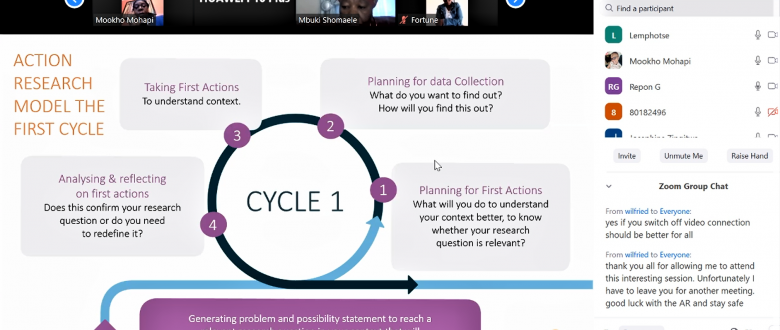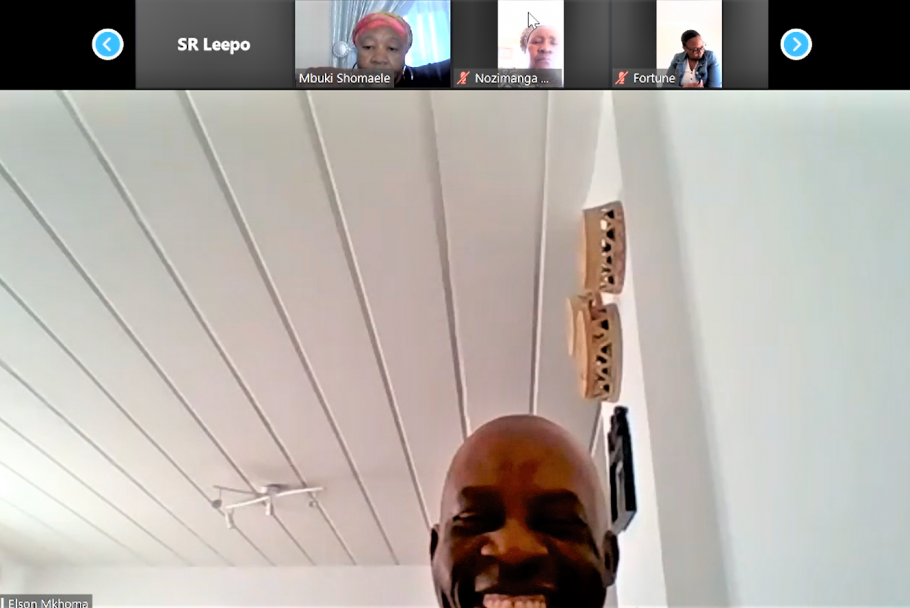
Good practices extracted from lockdown and social distancing
Action research (AR) involves re-examining the way you work. Action researchers explore different approaches to a challenge in their work, to find out which approach is the best to reach a desired change. Lessons learned allow VVOB to keep improving the learning trajectories. However, added to this, the Covid-19 outbreak encouraged us to explore how we can continue supporting action researchers from a distance.
In 2018 and 2019, 4 groups totalling more than 100 participants from the Departments of Education in the Free State and KwaZulu-Natal provinces took part in action research trajectories: several workshops and follow-up activities over a longer period of time. In 2020, VVOB is supporting two groups of education officials in the Free State province: a cohort of volunteers from four districts and a provincial office and a cohort of a district management team and other officials from the fifth district. These groups are thus the fifth and sixth cohort to be set in motion by VVOB.
The AR learning trajectories now take place through virtual learning sessions and online activities. Action researchers Ms Mookho Mohapi (Assistant Director Education Development and Support), Ms Glenda Repon (Subject Advisor Afrikaans, Xhariep) and Ms Dimakatso Msibi (Chief Education Specialist (CES) curriculum delivery, Lejweleputswa) shed light on how they experienced their first steps in this process.
Good practices: the advantages of online learning
Saving time and resources
‘As someone with a lot of responsibilities, I always have to juggle with my time and availability’, explains Ms Msibi. ‘Online meetings are shorter and more efficient than the face-to-face ones, which gives me some time to breath between all the different meetings that I would usually run around for.’ Ms Repon agrees: ‘Travelling is tiring’, she laughs. ‘Because Xhariep is so vast, some schools are 200 km away from our office. It takes me two hours to get there, and two hours to go back. If you travel like that for four days consecutively, you just want to be in the office and do admin on day five.’ Ms Mohapi concludes: ‘Staying home, not travelling, is a big advantage. It saves a lot of time and money.’
Conducive environment
‘People find themselves at home: an environment they are comfortable in’, states Ms Mohapi: ‘There is no face-to-face interaction. So, people are less likely to be shy. They share their input and views more easily.’ ‘Online learning is an opportunity to plan your work at a time that suits you best. You can work at your own pace’, explains Ms Repon. ‘The time we save by not physically going to the gatherings, we can invest in collecting additional information’, Ms Msibi suggests. ‘These online platforms are the ideal environment to share online materials. The facilitators can refer us to articles and recommend background information.’
Lessons learned
Technology is something new (and scary)
‘I was not the only one struggling to get into the online meeting for the first time’, explains Ms Mohapi: ‘Some people were talking during the presentations, because they didn’t know what to do. You easily lose concentration.’ ‘Not all of us are familiar with computers’, Ms Repon says: ‘Some people couldn’t give their input because they lacked some technological skills. They were afraid to make a mistake. And it’s difficult to meet and connect with other participants in a big online group.’ Ms Msibi agrees: ‘The live interaction gets lost, both between the participants as between the participants and the facilitators. Afterwards, I talked to another participant in a separate video call. Only then, we felt like we could speak throughout about our questions or doubts.’
Way forward
Online PLCs, coaching, mentorship and buddies
‘During an online trajectory, participants need more guidance’, indicates Ms Msibi. ‘Step by step: what is it that we need to do right now? What is expected from us?’ Programme coordinator Elson Mkhoma explains how VVOB implements extra online support: ‘Action researchers individually complete online activities. Because of the Covid-outbreak, we now follow up on this self-study process through virtual sessions, instead of through face-to-face workshops. Participants receive additional guidance through support systems like coaching, mentorship, a buddy system and professional learning communities (PLCs). Before the lockdown, these PLCs met through contact sessions and also connected through WhatsApp, now they use WhatsApp for virtual meetings and of course other ways of communication, like e-mail, phone and videocalls.’ VVOB’s programme advisor Paul Mphisa explains that a buddy system was set up: ‘Participants are paired as “buddies”. They can contact each other anytime, to discuss questions and challenges and encourage each other to move forward.’
Post-Covid online learning
The Department of Education is exploring how to improve e-learning initiatives beyond the lockdown. The e-learning AR experience of the Free State Department of Education will complement their e-learning unit initiatives. ‘Online learning can be very interesting to take along in the future’, Ms. Mohapi explains. ‘Sometimes, I have to meet with people from different districts: Lejweleputswa, Fezile Dabi, Xhariep… If you organise a meeting at 10 am in Bloemfontein, some participants have to leave their house at 4 am to be on time. As soon as you know and understand the online tools, you realise that they are user-friendly. We could set up a time, send the meeting ID and have people participate from their workplace. It would save time and money.’
Exploring and getting used to an online environment, participants and facilitators find themselves in a vulnerable position: it is new, exciting, and a bit frightening. During the first virtual follow-up session, Ms Mohapi summarised this well: ‘This online trajectory is a learning process. We now experience first-hand that all of us learn in a different way: some visually, some in group, some need guidance and others need more space. In that way, this experience brings us closer to the learners we are serving. That is a valuable position to work from, given that our goal is to enhance inclusivity.’





